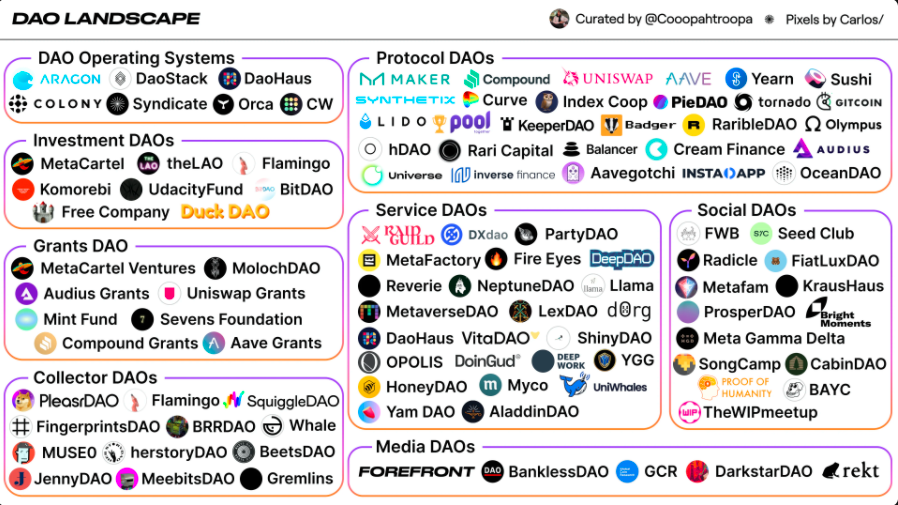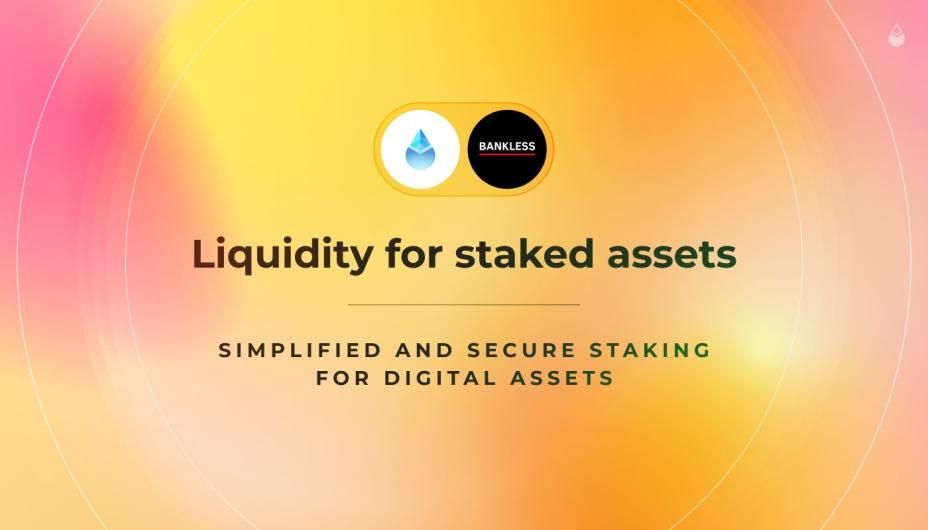How to get paid by DAOs


PoolTogether v4 lets you deposit in any pool on any supported chain for prizes across all pools!
Dear Bankless Nation,
In the past decade, the working class has increasingly shifted towards part-time employment. With discrete tasks and a burgeoning gig economy, both workers and employers are realizing that work is modular.
In the digital age, where creative work can be done from anywhere, we’ve seen the gig economy adapt itself to Web 3, dubbed as the creator economy.
DAOs, as digital organizations, are well poised to aggregate and coordinate the larger creator economy. Better yet, DAOs are positioned to capture value from your labor and distribute it back to you.
This is where Web2 companies will fail against DAOs. By nature, DAOs are community-owned, governed, and grown.
Dive in with Lucas as we explore the various ways that you can earn a living by working for a DAO, on your own terms.
- RSA
P.S. DAOpunk NFT project is another way to get paid while working for DAOs. Join Discord!
🙏 Sponsor: Lido—simplified and secure liquid staking for digital assets.
📺 State of the Nation
This week, we bring on pseudonymous founder Zeus to discuss this new generation of DeFi protocols, and how realigned incentives could change the fundamentals of crypto.
📺 Join us every Tuesday at 2 pm EST for the State of the Nation livestream!
WRITER WEDNESDAY
Bankless Writer: Lucas Campbell, Editor for Bankless & Core Contributor at Bankless DAO
How to get paid by DAOs

DAOs are digital communities with a shared mission and treasury. Over the past year, we’ve really seen this sector come into fruition with the rise of protocol DAOs like Uniswap and Sushi—which hold billions of dollars in capital—while also seeing the emergence of new community-driven social DAOs like Friends with Benefits and Bankless DAO.
With the growth of this sector comes plenty of opportunities. For those that are looking to start working in crypto, DAOs serve as a great starting point—especially for those willing to take the leap into web3 native work. This article will cover a DAO’s talent needs and some of the compensation mechanisms they use, so you can capitalize on the future of work in the digital world.
Here’s how to get paid by a DAO.
🥴 Still not quite sure what a DAO is? Read this post on WTF are DAOs?
Why DAOs are the next big thing
The future of work is digital. With the emergence of DAOs, anyone, anywhere, at any time can start working for a digital community.
Yearn’s core contributor and Coordinape lead, Tracheopteryx, made a great analogy on Bankless’ DAO Panel that truly resonated with me on the nature of DAO work: It’s like a party bike. You can contribute as much as you want to help move the organization forward. Or you can just sit there and drink beer.
It’s ultimately up to you how much you want to contribute to the overall success of the organization, whether that be four hours, forty, or none at all.

As people realize this flexible nature of DAO work, these digital organizations are maturing at a rapid pace. And as mentioned, comes more opportunity for the sovereign individual. There are more tools and mechanisms to compensate and reward core contributors based on their work. As a result, we’re seeing more individuals take the leap and go full-time DAO.
Today we’re going to dive into a handful of roles, activities, and mechanisms to capture this opportunity. We’ve seen many communities adopt these concepts in one way or another, and all offer a unique way for you to contribute and get paid for your work.
Here’s what you can do.

Different Ways to Contribute to DAOs
DAOs are in need of labor. They need people to work for them in order to achieve their core mission. Whether it’s for a protocol DAO like Yearn and Sushi looking to create a new paradigm in financial technology or Social DAOs like Friends with Benefits and Bankless DAO looking to propagate culture, there’s plenty of ways to contribute and add value. As mentioned, the cool part is you don’t have to work full time. It’s always up to you how much time you want to put in.
With that in mind, getting paid by a DAO can take some commitment and upfront work. You have to prove your value first before you can start earning the big bucks.
For those new to the DAO journey, the best ways to get started are to hop into the forums and Discords and participate in the discussion.
🤓 If you’re at this stage, read our piece on How to join a DAO!
This could be providing input on governance proposals or discussions and attending community calls. Once you learn the ropes, you can start getting into deeper and deeper work, like helping out with the DAOs core projects, or serving as a resource for new members. What matters most is that you’re active and providing value for the DAO. Over time, if you’re doing the right stuff, people will start taking notice!
Once you’ve built a reputation within the community, more opportunities will arise. It’ll usually start with completing one-off bounties, then maybe some part-time work, and then hopefully it will land you a full-time gig.
That said, there are usually a handful of roles that DAOs could always use to help with. Here are a few:
- Developers: There’s never enough technical talent in crypto. Virtually everyone could use it. Whether it’s developing new smart contracts, helping with back-end development, building beautiful user experiences, audits, and more, there’s no shortage of opportunity for those that can get in the weeds and write up code. Better yet, they usually can get paid serious money for it. If you’re a technical person, the DAO world is your oyster—take advantage of it.
- Community Managers: Community managers are another crucial role within DAOs. It makes sense too—DAOs are digital communities. They need people to help manage them. This could be pointing new members in the right direction, answering questions, managing the Discord, and generally just being a good steward of the community by bringing good vibes (DAOs are all about vibes!!). If you love building relationships and talking to people, community management is a great place to get involved.
- Content Creators: Similar to community managers, education is a key role. A lot of DAOs need talented writers and video creators to help market their product, service, or even community to the world. This is also one of the easiest ways to get started as you usually don’t need any permission! Just start creating content, publishing it on your own accord, and sharing it with the community. If people like it, it’ll gain traction and you’re off to the races.
- Designers: In a similar vein as developers, designers are a massive addition to the DAO world. It could be as simple as creating thumbnails and imagery for content creators, dropping hot new NFTs to propagate crypto culture, or more complex things like designing sleek front-ends for an upcoming product.
- Operations & Facilitators: DAOs can grow to be complex organizations. There’s a lot going on. Operators and facilitators serve a key role in ensuring that the overall organization is moving in the right direction and that mission-critical objectives are being accomplished. If you’re deeply plugged into the world of crypto, you can definitely help out by providing crucial context to the overall direction and ensuring the DAO is executing at the highest level. This generally includes project management, acting as multi-sig signers, connecting contributors to the right people, and more.
- Treasury Management: DAOs have capital and they need to find good ways to allocate it. Those with a financial background are always in demand, especially as DAOs continue to grow their treasuries to billions (and someday trillions). Treasury diversification, budgeting, financial reporting, and more are all useful skills for any DAO.
DAO-Specific Roles & Committees: Every DAO has its own respective missions. With it comes specific roles that they need. For example, Yearn needs Vault strategist to optimize yields, the Index Coop needs methodologists to design the best indices, Aave needs risk assessors, etc. Additionally, most DAOs have Grant Committees that need help with vetting grant requests and more.
Depending on your interest, these are some of the best opportunities to work in crypto and it’s usually where a lot more web3 native, unique work comes into play. That said, these are often the hardest roles to attain given they require you to be deeply involved within the community (while having a reputation to back it!). Explore the DAO ecosystem and see what fits best.
Different Ways to Get Paid by DAOs
DAO infrastructure is an emerging sector, and novel compensation mechanisms are a key part of it. Fortunately, over the past year or so, we’ve seen more tools to help compensate contributors in various ways. The sector has also seen well-funded DAOs adopt more traditional mechanisms like USD-based salaries that feature token-based compensation packages (similar to stock options!).
By contributing to a DAO, you’ll almost always earn ownership in that community. From my perspective, earning ownership in these protocols and communities is the highest form of leverage in the world right now. Capitalize on this opportunity and you’ll be rewarded.
Here are a few to look out for depending on your level of commitment.
- Get hired full time: A lot of well-funded DAOs, namely protocol DAOs, have adopted the standard compensation model that’s prevalent in many startups for full-time contributors. Protocols like Yearn and Sushi offer stablecoin based salaries along with hefty bonuses in the protocol’s native token (i.e. YFI and SUSHI). It’s worth noting that landing a full-time role at a DAO can take a lot of upfront work, but those that can prove out their value can be compensated well. For reference, I’ve personally seen compensation structures for core contributors that go upwards of millions of dollars per year (see Sushiswap’s hiring guidelines).
- Coordinape: Coordinape is a web3-native compensation tool that spun out of the Yearn ecosystem. To quickly summarize, it’s a peer assessment-based tool where contributors can allocate “GIVE” tokens to their colleagues based on the amount of work they’ve done over some period of time. At the end of the round, users split the pool of funds pro-rata based on the amount of “GIVE” they received from their peers. Overall, Coordinape has been one of the most unique and interesting ways to compensate contributors that we’ve seen firsthand at Bankless DAO. Despite facilitating the largest rounds by numbers of contributors (stress testing Dunbar’s number), the end compensation seems to largely represent the actual work done by individual contributors (i.e. the most active contributors tend to rise to the top of the charts).
- Grants: Virtually every major DAO has a Grants Program at this point. These are often run by a small group of community-elected contributors who are responsible for reviewing grant requests and allocating capital accordingly. Protocol DAOs like Compound, Uniswap, Aave, and others have massive pools of capital that they’re distributing to those that can build unique products or offer valuable services on top of the protocol. If you’re a builder at heart, submitting a proposal to do meaningful work can get you paid via a grant from one of these committees.
- Bounties: Bounties have been around the crypto ecosystem for a while, but are starting to pick up traction again due to the emergence of digital work for DAOs. Bounties typically feature discrete tasks that allow individuals, especially newer community members, to get involved and add value to the DAO in return for native token compensation. The tools here are still nascent, but Bankless DAO is working on it with the launch of Bounty Board. Expect bounties to become increasingly more popular as the infrastructure to support them becomes more established.
- SourceCred: SourceCred is another web3-native tool that’s arisen in popularity among certain communities, namely FWB. SourceCred offers an interesting way to reward community members for their participation in discussions like Discord and Governance proposals on the forum. To summarize how this works, similar to Coordinape, the SourceCred software tracks messages and participation KPIs (Eg. the number of likes on a forum reply, how many reactions your message receives, GitHub commits) to allocate CRED to individual users. At the end of each period, tokens in a pool are distributed to individuals based on the amount of CRED accrued in that period.
- Revenue Sharing: Communities are powerful. If you build something the community wants, they will reward you for it via demand for the product or service. Enough so that individuals can actually earn a cut of the revenue they generate from the product while also aligning with the DAO by allocating a portion of the revenue to the community treasury. We’ve primarily seen this first hand with Bankless DAO and MetaFactory Merch, NFT Showcases, and the BED Index. Here, community members can earn a portion of the revenue generated from the merch and NFT sales. The community provides a customer base while the creator provides a valuable product or service that the DAO wants.
Conclusion
DAOs are bustling with activity. There’s no shortage of opportunity for those looking to take the leap into the future of work and contribute to a DAO. The best part is that you have the flexibility to do it, even if you work a full-time job. You can contribute as much or as little as they want—the only thing that matters is the actual value from your work.
For individuals that find themselves garnering a significant amount of reputation within a DAO’s community, the upside can be exponential. Whether it’s earning a competitive full-time compensation package that rivals the biggest tech companies or the joy of organically being recognized by your peers, there’s plenty of ways to get paid by these new digital organizations.
The best part? We’re only scratching the surface of what’s possible.
We’ll see you on the frontier.
Action steps
- 🤔 New to DAOs? Learn what a DAO is and how they work.
- 🤿 Want to dive in but not sure where to start? Read this guide!
- 🧠 Think macro-level with last week’s post on DAOs as economies.
Author Bio
Lucas Campbell is the Editor for Bankless and core contributor to Bankless DAO. He also engages with teams on token economic & governance design through 🔥 _🔥 (Fire Eyes DAO), working with industry-leading projects like Aave, Balancer, Gitcoin, SuperRare, and others.
Subscribe to Bankless. $22 per mo. Includes archive access, Inner Circle & Badge.
🙏Thanks to our sponsor
Lido
👉 Stake your crypto assets on Lido—now supports ETH, SOL, and LUNA
Lido lets users stake their assets and receive a tokenized derivative that automatically earns daily rewards. With Lido, your staked assets can be used across the DeFi ecosystem. You can lend, borrow, and more with your assets while maximizing your yield. Stake with Lido.

Want to get featured on Bankless? Send your article to submissions@banklesshq.com
Not financial or tax advice. This newsletter is strictly educational and is not investment advice or a solicitation to buy or sell any assets or to make any financial decisions. This newsletter is not tax advice. Talk to your accountant. Do your own research.
Disclosure. From time-to-time I may add links in this newsletter to products I use. I may receive commission if you make a purchase through one of these links. Additionally, the Bankless writers hold crypto assets. See our investment disclosures here.